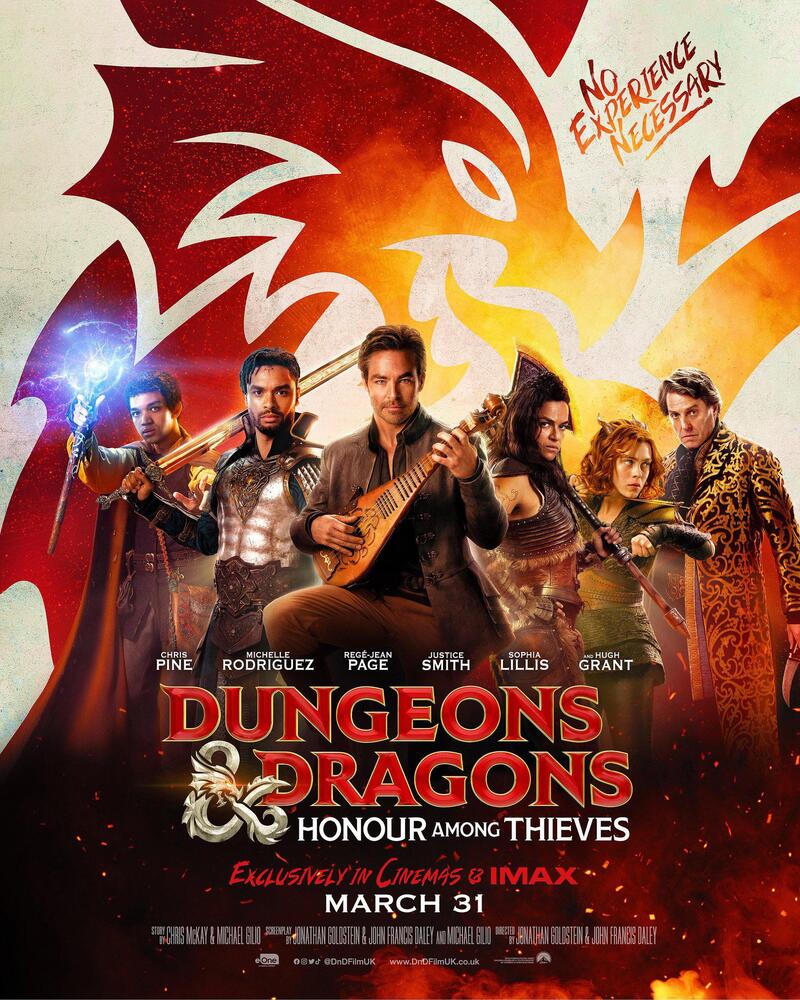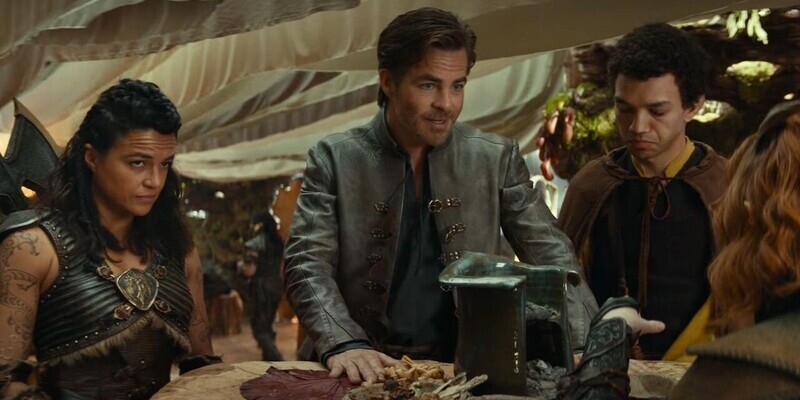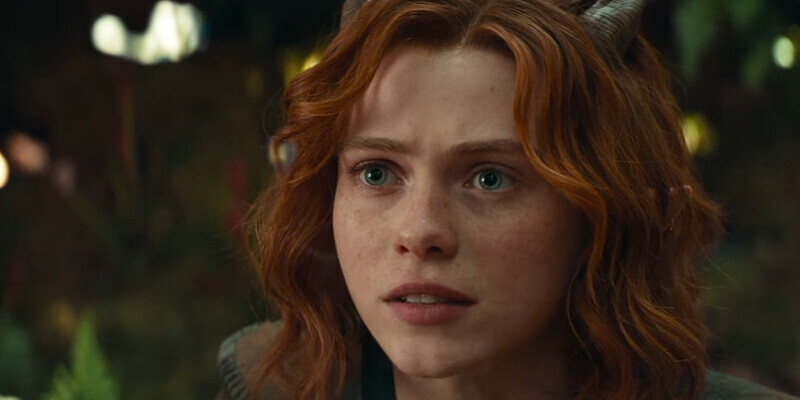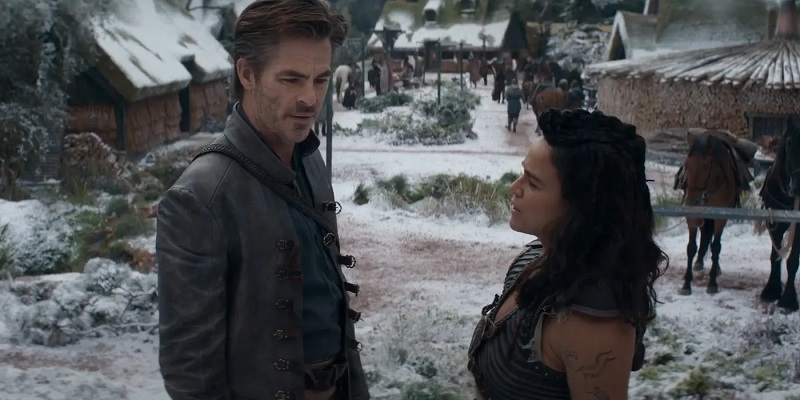
Review by
Eric Hillis
Directed by: Jonathan Goldstein, John Francis Daley
Starring: Chris Pine, Michelle Rodriguez, Regé-Jean Page, Justice Smith, Sophia
Lillis, Chloe Coleman, Daisy Head, Hugh Grant

Launched in the 1970s amid that decade's post-hippy fad for all things
of a fantastical nature, table-top role-playing game Dungeons &
Dragons gained much attention in the 1980s, largely due to negative
publicity that ridiculously linked the game to the era's "Satanic
Panic." An episode of the 1980s set TV show
Freaks and Geeks revolved around its "geeks" playing the
game, and now that show's star, John Francis Daley, has delivered
a big screen, big budget adaptation of the game with co-director
Jonathan Goldstein, one which takes its cues not just from the
fantasy films of the 1980s, but also
Big Trouble in Little China. It gently mocks the tropes of the fantasy genre, but it's also in
tune with those tropes and exploits them in a way that is often uniquely
inventive.

While the game has an established canon and lore with various spinoff
books, by its nature it allows the player the freedom to create their
own heroes, something Daley, Goldstein and co-writer
Michael Gilio take advantage of. Chris Pine's thief Edgin
is a Jack Burton figure, smooth talking but largely incompetent. Lucky
for him he has a tough, streetwise companion in the barbarian Holga (Michelle Rodriguez) to bail him out of trouble. When we find the pair first they're in
hot water however, having spent two years in a remote prison. In the
first of several ways the film finds to have fun with the notion of
clunky exposition and backstories, Edgin uses a parole hearing as a sort
of "Last time on Dungeons & Dragons," filling the audience in on how
his wife was killed by a vengeful Red Wizard, leaving he and Holga to
raise his daughter, Kira (Chloe Coleman). Far from a model
father, Edgin continued his thieving ways - accompanied by a young
sorcerer, Simon (Justice Smith), and an aging con-man, Forge (Hugh Grant) – until he was finally brought to justice.
Escaping from their prison, Edgin and Holga make their way to
Neverwinter, a kingdom now ruled by Forge with the aid of Sofina (Daisy Head), a powerful Red Wizard. Forge has become a father figure to Kira, and
he lies to the child when he has Edgin and Holga sent for execution.
Escaping Neverwinter, our heroes reteam with Simon and enlist a
shapeshifter, Doric (Sophia Lillis), to plot a means of getting
Kira back and bringing Edgin's dead wife back to life.

The resulting action is something like a Shrek movie, but without any
of that franchise's annoying concessions to modern pop culture. Its
humour is of a more vintage variety, with roots in the films of Bob
Hope. It seems at first that Pine is set to be the Hope figure, the
hapless hero who continually mocks the premise, but the movie oddly
sidelines him at certain points, as though some scenes were written by a
screenwriter who wasn't fully in on the joke. When he's allowed to take
certain stage Pine is a surprisingly good comic lead, with the film
taking its cues from the aforementioned
Big Trouble in Little China in taking a handsome movie
star and having him act the clown. It's no surprise that the film is at
its funniest whenever Grant is on screen, as he channels the bumbling
nature of former British Prime Minister Boris Johnson to great effect.
Indeed, one gag involving Forge being raised on a column to a height he
finds disorienting seems directly inspired by the sort of misguided
hijinks Johnson would find himself in on more than one occasion
throughout his reign.
Had the movie solely relied on mocking its genre it would likely have
come off as irritating, but Daley and Goldstein embrace the
possibilities of fantasy filmmaking in a way few others have recently.
There are some surprisingly visually inventive set-pieces that show the
filmmakers have put some effort into this. A major gripe I have with the
last couple of decades' wave of superhero movies is that they almost
never do anything interesting with their heroes' superpowers. Not so
here, as the concept of magic is mined to striking effect at times.
There's a chase sequence involving Lillis's shapeshifter that uses that
conceit to pull off the sort of visual gags not seen since the heyday of
Scooby Doo (there's one odd moment however where the heroes face an
obstacle that could have easily been resolved by Doric morphing into a
bird – perhaps a sly nod to the famous plothole in
The Lord of the Rings?). A device known as a "Hither and Tither" portal plays into an
extravagant sequence that delivers a clever fantasy riff on a stagecoach
heist. A climactic chase through a maze recalls classic video games in a
way few actual video game adaptations have managed. Supplementing its
greenscreen with location shoots in the convincingly fantastical
landscapes of Iceland and Northern Ireland gives it a production value
missing from its comic book counterparts.

In terms of wit and inventiveness,
Dungeons and Dragons: Honour Among Thieves has a lot going
for it. Sadly, there's one issue it can't surmount, and that's modern
Hollywood's insistence on bloated running times. At 90 minutes, this
could have been a rip-roaring blast, but at 135 it sags in too many
points, and like many fantasy movies, has a couple too many climaxes.
The suits in Hollywood probably see this as a way of convincing
audiences they're getting more bang for their buck, but it's
counter-intuitive. A 7" pizza with 10 slices of pepperoni makes for good
value, but a 12" pizza with 10 slices of pepperoni, not so much. In this
way, Dungeons and Dragons: Honour Among Thieves does
replicate the experience of playing a table-top game. It's great fun for
90 minutes until your character dies and you're left waiting around
while your friends continue having fun without you for another
hour.


